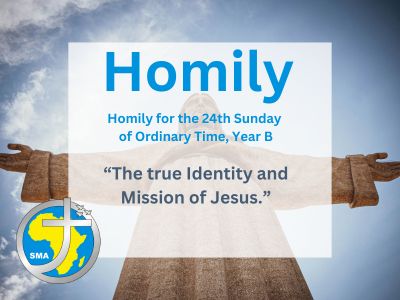Readings: Is 50:5-9; James 2:14-18; Mk 8:27-35
Theme: The true Identity and Mission of Jesus
Caesarea Philippi, the setting of today’s gospel is located on the southern slopes of Mount Hermon in the northernmost part Israel. It was originally known as Banyas (or Panias) in honour of the Greek god, Pan. During the time of Jesus, Herod the Great built a city there and named it Caesarea, after the Roman Emperor. Herod’s son, Philip, added his own name to it.. It’s a place of striking beauty, where as stream of water gushes forth from a huge face of solid rock, becoming the source of the river Jordan. In the Spring of 2008, I had the privilege of visiting this site during a four month’s sojourn in the Holy Land, and of reading there today’s gospel passage.
At this meeting place of Greek, Roman and Jewish cultures, Jesus raises the question of his identity with his closest disciples and clarifies the nature of his mission. He begins by asking them ‘Who do people say I am? (Mk 8:27). The response of the disciples reflects a diversity of opinion about Jesus’ identity. Most of his contemporaries considered Jesus to be a prophet, like John the Baptist or Elijah, who pointed the way to the Messiah. Jesus then challenges his disciples with a much more personal question: ‘But you, who do you say I am?’ And Peter, speaking on their behalf, responds: ‘You are the Christ’ (Mk 8:29). That is, you are the Messiah, the long-awaited King of Israel.
Surprisingly, Jesus is not overjoyed at Peter’s confession of his true identity. He orders his disciples not to tell anyone about him. The reason for Jesus’ caution is that most of his contemporaries expected the promised Messiah to be a powerful king who would accomplish victory over Israel’s enemies by force of military might. He would be an all conquering hero untouched by suffering or defeat. This expectation could not be further from Jesus’ understanding of his messianic identity and mission. So he begins to inform his disciples that he ‘is destined to suffer grievously, to be rejected by the elders and the chief priests and the scribes, and to be put to death, and after three days to rise again’ (Mk 8:31).
Shocked by these words of Jesus, Peter begins to ‘remonstrate with him’ (Mk 8:32). For Peter, as indeed all the disciples, it was unthinkable that the Messiah should endure the kind of fate Jesus had described. What Jesus was saying did not make sense to them. It was not part of their scenario for him. Peter and the disciples want the Messiah to be strong, victorious and invulnerable. Jesus’ frighful prognosis must be nipped in the bud.
However, the reaction of Jesus is even stronger than Peter’s protest. He does not hesitate to call Peter ‘Satan’: ‘Get behind me, Satan! Because the way you think is not God’s way, but man’s’ (Mk 8:33). Peter’s protest reminds Jesus of Satan, who at the beginning of his ministry had tried to deflect him from his true path, using false interpretations of verses from Scripture. Peter is now effectively doing Satan’s work, thus becoming a stumling block to Jesus’ fulfillment of his mission. So he must be roundly rejected. He and his disciples must understand that their cherished Messiah is going to be the Suffering Servant of Isaiah. It is clear that the disciples still had much to learn about their Master. Yes, they had reached the critical stage of knowing who Jesus was – the Messiah, but they were far from understanding the true nature of his messianic vocation, and what that would mean for them.
Addressing not just his companions but all his would be disciples, Jesus continues: ‘If anyone wants to be a follower of mine, let him renounce himself and take his cross and follow me. For anyone who wants to save his life will lose it; but anyone who loses his life for my sake, and for the sake of he gospel, will save it’ (Mk 8:34-35). The way of Jesus has be our way. Jesus is inviting us to take up our own crosses, the sufferings that come our way when we follow in his footsteps. He wants us to let go of the things we think will keep us safe and give us security. For this would be wanting to save our lives instead of losing them for the sake of the gospel. He is inviting us to take the risk of losing our lives. This means imitating Jesus by entrusting ourselves to our beloved Father and letting him take control. It means, to echo the theme of James in our second reading, putting our faith to work in the service of others. I conclude with a prayer, entitled My Surrender Prayer, that may help us take to heart the challenge of Jesus in today’s gospel.
Abba God,
I welcome everything that comes to me today.
I welcome all persons and situations, thoughts and feelings.
Fill the hole in my heart with your unconditional love.
Help me to let go of the things I have become attached to because of my wounds:
my need to accumulate;
my need to be busy;
my need to be perfect;
my need to be liked;
my need to feel important;
my need to be in control;
my need to change others.
Open my eyes to the ways you are present in my life. Amen.
Listen to an alternative audio homily from Fr Tom Casey SMA.

